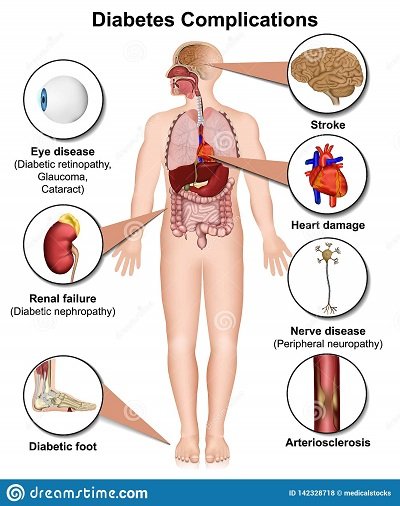News
Diabetes and speaking in “tongues”

I have on several occasions had the unpleasant duty of telling family, friends and clients about a medical condition that they may be challenged with; heart disease, stroke, HIV, COVID-19, cancer etc. but none of them seem to have the same impact as DIABETES. Many people who have never seen the inside of a church building will break out into uncontrollable “tongues” that will amaze even the Apostles at Pentecost. That is how much diabetes is feared and it can cause havoc if not managed properly.
Diabetes on its own will not kill even if it wipes your bank account dry BUT the organ complications that come with poor management or no management is the killer. That is why the theme for World Diabetes Day (November 14) from 2021 to 2023 is ACCESS TO DIABETES CARE. Insulin which is the mainstay of diabetes and its management was discovered a century ago yet millions of people with diabetes around the world cannot access the care they need.
NO “SUGAR-COATED” STATISTICS
463 million adults have diabetes worldwide
To put in perspective, if people with diagnosed Diabetes were a country on its own, their population will be more than that of the USA.
THE International Diabetes Federation (IDF) predicts that 700 million people worldwide will have diabetes by 2045. Well, unless we all do something drastic.
Diabetes complications caused 4.2 million deaths worldwide in 2019.
Adults with diabetes have a two to three-fold increased risk of heart attacks and strokes (WHO, 2020).
85 per cent of the world’s foot amputations are a result of a diabetic foot ulcer. (The American Journal of Managed Care, 2018).
African-Americans are four times more likely than whites to have a diabetes-related amputation. (The American Journal of Managed Care, 2018).
Diabetes Retinopathy (long-term damage to retinal blood vessels) causes 2.6 per cent of vision loss worldwide. (WHO, 2020).
TELL-TALE SIGNS of DIABETES
The majority (90 per cent to 95 per cent) of people with diabetes have Type 2 diabetes and this starts slowly and we may often ignore the warning signs.
If we can test for COVID-19 for FREE and vaccinate for FREE, I dare say we owe it a duty to test every person over the age of 18 years for diabetes. Let us not wait. We have to stop the march towards 700 million people.
Be wary of these and see your healthcare professional immediately:
Increased appetite or unexplained weight loss
Slow-healing cuts
Frequent yeast infections (including “whites”)
Pain or numbness in extremities
Vision changes
Fruity or sweet-smelling breath
Fatigue or weakness
Dry mouth or dry skin
Extreme thirst
Frequent urination
TO-DO LIST STARTS TODAY
We cannot avoid certain risk factors such as age, people in our family with diabetes (family history) BUT we can modify some factors that will prevent or prolong the onset of prediabetes, Type 2 diabetes and complications of diabetes. Many of these require individual effort and that essentially means the power is in our hands to a large extent.
Today I will start the following and keep at it and I pray you do the same too;
Maintaining a healthy weight
The body loves moderation. Being underweight or overweight is a risk for several diseases including diabetes.
Losing 5 per cent to 7 per cent of body weight and exercising at least 150 minutes a week in addition decreased the risk of developing Type 2 diabetes in a study group by up to 58 per cent.
Eating a healthy diet and in the appropriate quantity
We definitely are what we eat…Haven’t we all had enough sugar? Can we start by cutting out sugar and reducing our portions of refined carbohydrates such as white bread and white rice?
Persistent physical activity or exercising at least five (5) days a week.
Yes by all means walk, ride a bike, swim and engage in interval training but also ensure you do “resistance exercises (using free weights, resistance bands, weight machines etc.) increased strength in adults with Type 2 diabetes by 50 per cent and improved glycated haemoglobin by 0.57 per cent.” (Diabetes Care, 2016). Glycated haemoglobin is a measure of our long-term control of blood sugar.
Managing Stress
Stress affects every part of our body and health. In addition to flooding our bodies with cortisol that will lead the charge to lay down fat in our midsection, it also affects our eating pattern, sleep duration and quality, drinking habits and exercise schedules. Unfortunately it does all these in the negative way.
Checking blood sugar
We surely need to check our blood sugar with or without symptoms of diabetes
Do not be stuck on just fasting blood sugar but sometimes insist on random blood sugar when you take a sample two hours after a meal for instance or even get a glycated haemoglobin test as well. Oh and there is no harm in checking your urine as well.
Diabetes is a PANDEMIC too and we need to take it more seriously. The cost to individuals, families and countries when people have diabetes and especially those with complications has always been underestimated. Very often we overlook the social, mental, physical/productivity aspects and focus only on the financials and even that has totally gone through the roof and is targeting space. I hope we can all do our bit to reach especially those who cannot afford to test and adopt the appropriate lifestyle. May the powers that be listen and act.
AS ALWAYS LAUGH OFTEN, ENSURE HYGIENE, WALK AND PRAY EVERYDAY AND REMEMBER IT’S A PRICELESS GIFT TO KNOW YOUR NUMBERS (blood sugar, blood pressure, blood cholesterol, BMI)
Dr. Kojo Cobba Essel
Health Essentials Ltd/ Mobissel Ltd
Dr. Essel is a medical doctor, holds an MBA and is ISSA certified in exercise therapy, fitness nutrition and corrective exercise.
Thought for the week –“In 2012 about 56 million people died throughout the world; 620,000 of them died due to human violence (war killed 120,000 people, and crime killed another 500,000).
In contrast, 800,000 committed suicide, and 1.5 million died of diabetes. Sugar is now more dangerous thangunpowder.”
― Yuval Noah Harari, Homo Deus: A History of Tomorrow
References:
International Diabetes Federation (IDF)
World Health Organisation (WHO)
By Dr. Kojo Cobba Essel
News
Watch your mattresses!…they can cause chronic back pain, other health disorders

Local mattress manufacturers have raised serious concerns over the influx of substandard mattresses, warning that these products pose significant health risks to consumers and threaten the sustainability of Ghana’s mattress industry.
At a press briefing held in Kumasi on Tuesday, manufacturers accused unregistered foreign entities, particularly Chinese firms, of flooding the market with cheap mattresses made from polystyrene.
Mr Yaw Ampem Darko, a spokesperson for the local manufacturers, warned that prolonged use of substandard mattresses, especially those made with polystyrene, could result in chronic back pain, musculoskeletal disorders, poor posture, and diminished sleep quality.
These health implications, they stressed, were not always immediately evident but accumulate over time, especially among vulnerable populations such as children and the elderly.
This material, typically used for packaging, is considered unsuitable and unsafe for bedding.
According to industry leaders, these sub-standard products have been circulating for at least five years, gaining traction among unsuspecting consumers due to their unusually low prices.
“These mattresses are being sold at suspiciously low prices, luring unsuspecting consumers who are unaware of the health dangers.”
“We are not just protecting our businesses; we are protecting Ghanaian lives. The government must act swiftly to stem this tide before more citizens fall victim to these dangerous products,” Mr Yaw Ampem Darko stated.
The Ghana Standards Authority (GSA) has acknowledged the issue and, in response, announced a nationwide enforcement campaign aimed at clamping down on the production, distribution, and sale of substandard mattresses.
The campaign, which was scheduled to take effect from September 30, 2025, was empowered by the GSA Act, 2022 (Act 1078), which authorises the Authority to seize and seal non-compliant products and impose sanctions on offenders.
In a statement signed by the Director General of the GSA, Professor George Agyei, the authority cited Sections 29 and 43 of the Act, reiterating that all mattresses sold in Ghana must meet established national standards or face confiscation.
The statement further emphasised that mattresses failing to meet these standards not only compromise sleep quality but also contribute to long-term health complications, including spinal and neck pain.
Despite the GSA’s commitment, manufacturers have expressed frustration over delays in implementation and called for stronger enforcement mechanisms.
They urged the GSA to work in close collaboration with the Customs Division of the Ghana Revenue Authority and national law enforcement agencies to identify and prosecute violators of Ghana’s quality standards.
Manufacturers are also appealing to consumers to remain vigilant and prioritise their health by verifying that any mattress they purchase bears the GSA certification mark.
Moreover, they caution the public against purchasing suspiciously cheap mattresses that lack proper labelling or identifiable branding, as these were often indicators of substandard or counterfeit products.
As the official enforcement deadline had expired with no show, the local producers insisted that much more than business interests were at stake.
They argued that without swift and sustained action, the health and safety of Ghanaian consumers would continue to be compromised.
“Public awareness, strict enforcement, and collaboration among regulatory bodies are essential if we are to protect the integrity of the local industry and the wellbeing of the Ghanaian people,” Mr Darko indicated.
From Kingsley E. Hope, Kumasi
Join our WhatsApp Channel now!
https://whatsapp.com/channel/0029VbBElzjInlqHhl1aTU27
News
Raissa Initiative demands harsher punishment for sexual abusers of girls

The Founder of the Raissa Child Protection Initiative, Ms Raissa Sambou, has urged authorities to impose severe punishment on individuals, including teachers and guardians, who sexually abuse young girls.
Speaking in an interview to mark this year’s International Day of the Girl Child (October 11), Ms Sambou condemned the increasing cases of sexual exploitation involving minors, describing such acts as “heartless, criminal, and a total betrayal of trust.”
She noted that those entrusted with the care and education of children must not be the same people who violate them, stressing that “anyone found guilty of abusing a girl child must face the full rigours of the law without leniency.”
The International Day of the Girl Child is observed annually to promote the rights of girls, empower them to reach their full potential, and draw attention to the challenges they face worldwide.
Ms Sambou lamented that poverty continues to push many young girls into vulnerable situations, exposing them to exploitation.
She expressed concern that some headmasters, teachers, and community members who should protect girls rather take advantage of them.
“This must stop immediately. The safety of every girl must never be compromised,” she said, urging the public to report all forms of abuse to the appropriate authorities and called for swift action by law enforcement agencies against perpetrators.
Addressing girls directly, Ms Sambou encouraged them to take their education seriously and to believe in their potential.
“It is possible to be young and responsible. Your future is bright, protect it, believe in it, and never let anyone dim your light,” she advised.
She further urged girls to choose their friends wisely, stay disciplined, and speak up if anyone makes sexual advances toward them.
Ms Sambou concluded with a rallying call for collective action, saying “speak up, protect them, and empower them. Together, we can end the sexual exploitation of girls.”
By Esinam Jemima Kuatsinu
Join our WhatsApp Channel now!
https://whatsapp.com/channel/0029VbBElzjInlqHhl1aTU27






